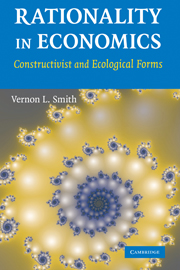Book contents
- Frontmatter
- Contents
- Preface
- Acknowledgments
- Introduction
- PART I RATIONALITY, MARKETS, AND INSTITUTIONS
- PART II IMPERSONAL EXCHANGE: THE EXTENDED ORDER OF THE MARKET
- 3 Relating the Two Concepts of a Rational Order
- 4 Market Institutions and Performance
- 5 Asymmetric Information and Equilibrium without Process
- 6 FCC Spectrum Auctions and Combinatorial Designs: Theory and Experiment
- 7 Psychology and Markets
- 8 What Is Rationality?
- PART III PERSONAL EXCHANGE: THE EXTERNAL ORDER OF SOCIAL EXCHANGE
- PART IV ORDER AND RATIONALITY IN METHOD AND MIND
- References
- Index
5 - Asymmetric Information and Equilibrium without Process
Published online by Cambridge University Press: 18 May 2010
- Frontmatter
- Contents
- Preface
- Acknowledgments
- Introduction
- PART I RATIONALITY, MARKETS, AND INSTITUTIONS
- PART II IMPERSONAL EXCHANGE: THE EXTENDED ORDER OF THE MARKET
- 3 Relating the Two Concepts of a Rational Order
- 4 Market Institutions and Performance
- 5 Asymmetric Information and Equilibrium without Process
- 6 FCC Spectrum Auctions and Combinatorial Designs: Theory and Experiment
- 7 Psychology and Markets
- 8 What Is Rationality?
- PART III PERSONAL EXCHANGE: THE EXTERNAL ORDER OF SOCIAL EXCHANGE
- PART IV ORDER AND RATIONALITY IN METHOD AND MIND
- References
- Index
Summary
An exact mathematical theory means nothing unless we recognize an inexact non-mathematical knowledge on which it bears and a person whose judgment upholds this bearing.
Polanyi (1969, p. 195)Rationality in Asymmetric Information Markets
In 2001, on the one-hundredth anniversary of the Nobel Foundation, the Swedish Academy recognized one of the more influential developments within the economics profession since the prize in economics had been established: the burgeoning field of information economics. Because of the large literature that has emerged on models of asymmetric information, no one in economics could doubt that the award and its three recipients were highly deserving of this landmark recognition of that influence. Here is how two of the recipients saw the new developments they helped to pioneer (the third, Michael Spence, is discussed later in this chapter):
In the late 1960s there was a shift in the job description of economic theorists. Prior to that time microeconomic theory was mainly concerned with analyzing the purely competitive, general equilibrium model. … In some markets, asymmetric information is fairly easily soluble by repeat sale and by reputations. In other markets, such as insurance markets, credit markets, and the market for labor, asymmetric information … results in serious market breakdowns … the elderly have a hard time getting health insurance; small businesses are likely to be credit-rationed; and minorities are likely to experience statistical discrimination in the labor market … (Akerlof, 2002, pp. 365, 368).
For more than a hundred years formal modeling in economics has focused on models in which information was perfect. One of the main results of our research was to show … that even a small amount of information imperfection could have a profound effect on the nature of the equilibrium. …
- Type
- Chapter
- Information
- Rationality in EconomicsConstructivist and Ecological Forms, pp. 94 - 114Publisher: Cambridge University PressPrint publication year: 2007



